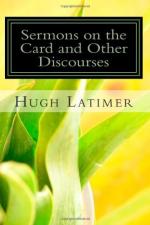hath any spiritual charge in the faithful congregation,
and whosoever he be that hath cure of souls.
And well may the preacher and the ploughman be likened
together: first, for their labour of all seasons
of the year; for there is no time of the year in which
the ploughman hath not some special work to do:
as in my country in Leicestershire, the ploughman
hath a time to set forth, and to assay his plough,
and other times for other necessary works to be done.
And then they also maybe likened together for the
diversity of works and variety of offices that they
have to do. For as the ploughman first setteth
forth his plough, and then tilleth his land, and breaketh
it in furrows, and sometime ridgeth it up again; and
at another time harroweth it and clotteth it, and
sometime dungeth it and hedgeth it, diggeth it and
weedeth it, purgeth and maketh it clean: so the
prelate, the preacher, hath many diverse offices to
do. He hath first a busy work to bring his parishioners
to a right faith, as Paul calleth it, and not a swerving
faith; but to a faith that embraceth Christ, and trusteth
to his merits; a lively faith, a justifying faith;
a faith that maketh a man righteous, without respect
of works: as ye have it very well declared and
set forth in the Homily. He hath then a busy
work, I say, to bring his flock to a right faith,
and then to confirm them in the same faith: now
casting them down with the law, and with threatenings
of God for sin; now ridging them up again with the
gospel, and with the promises of God’s favour:
now weeding them, by telling them their faults, and
making them forsake sin; now clotting them, by breaking
their stony hearts, and by making them supplehearted,
and making them to have hearts of flesh; that is, soft
hearts, and apt for doctrine to enter in: now
teaching to know God rightly, and to know their duty
to God and their neighbours: now exhorting them,
when they know their duty, that they do it, and be
diligent in it; so that they have a continual work
to do. Great is their business, and therefore
great should be their hire. They have great
labours, and therefore they ought to have good livings,
that they may commodiously feed their flock; for the
preaching of the word of God unto the people is called
meat: scripture calleth it meat; not strawberries,
that come but once a year, and tarry not long, but
are soon gone: but it is meat, it is no dainties.
The people must have meat that must be familiar and
continual, and daily given unto them to feed upon.
Many make a strawberry of it, ministering it but
once a year; but such do not the office of good prelates.
For Christ saith, Quis putas est servus prudens
et fidelis? Qui dat cibum in tempore.
“Who think you is a wise and faithful servant?
He that giveth meat in due time.” So that
he must at all times convenient preach diligently:
therefore saith he, “Who trow ye is a faithful
servant?” He speaketh it as though it were a
rare thing to find such a one, and as though he should
say, there be but a few of them to find in the world.
And how few of them there be throughout this realm
that give meat to their flock as they should do, the
Visitors can best tell. Too few, too few; the
more is the pity, and never so few as now.




